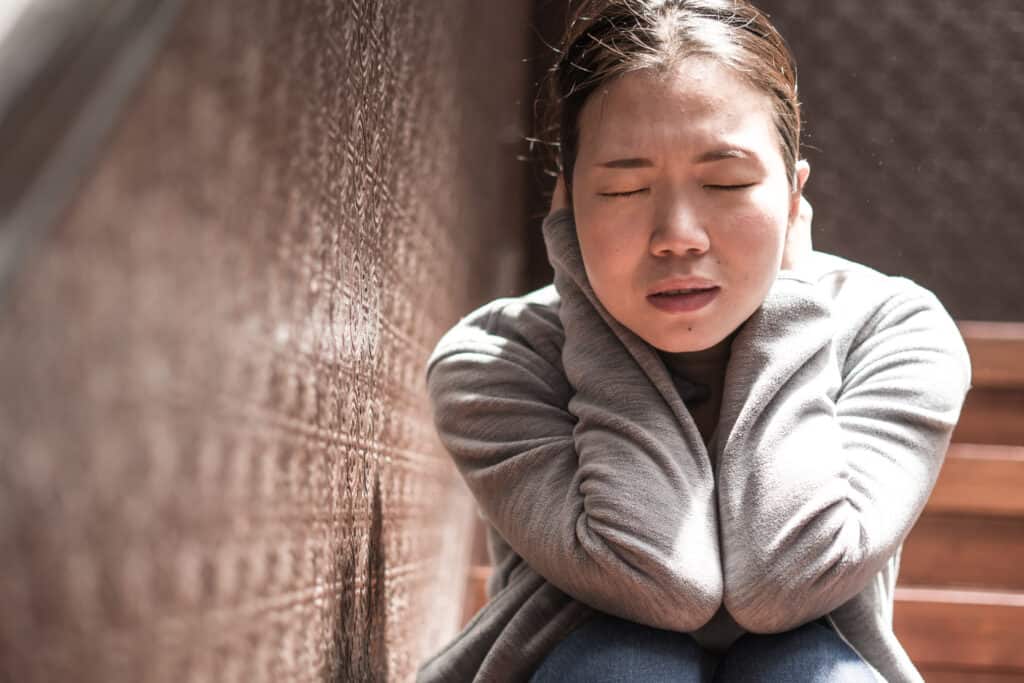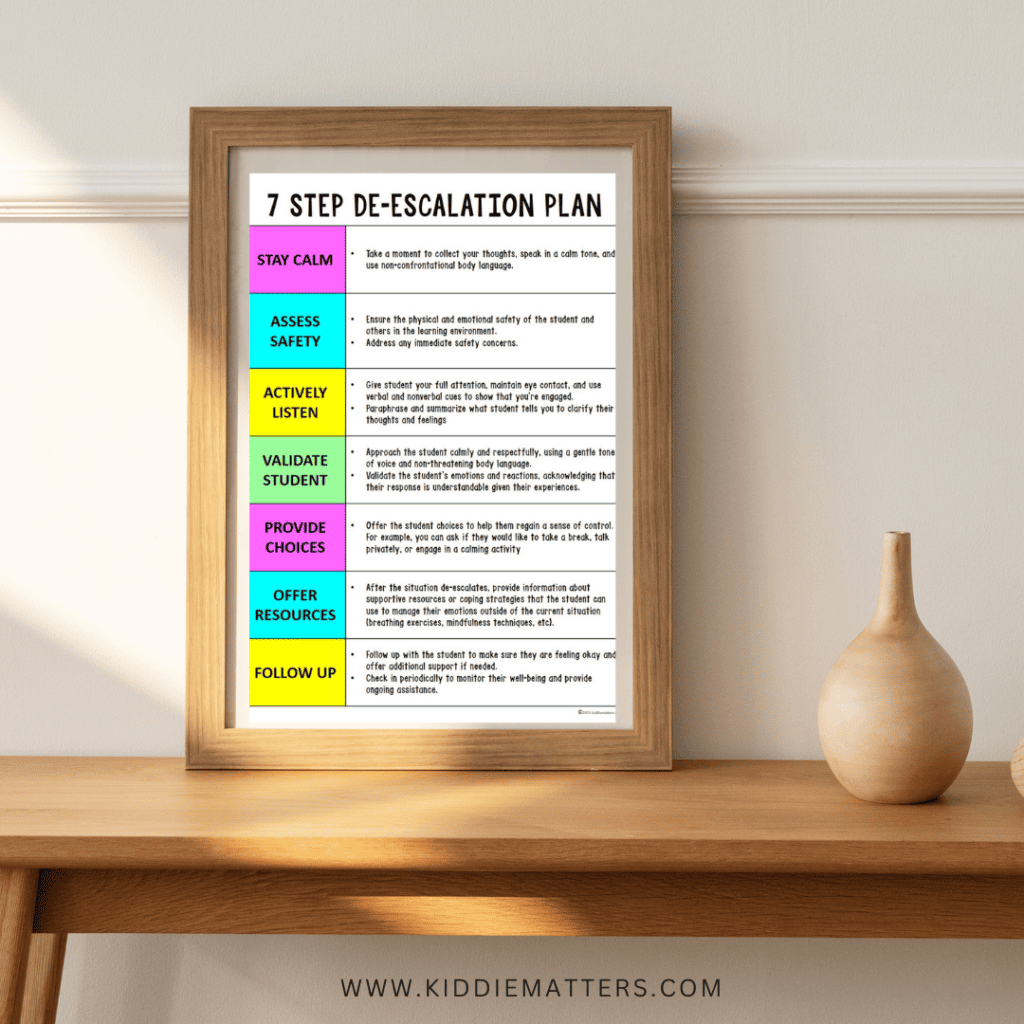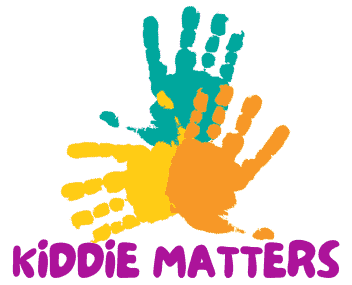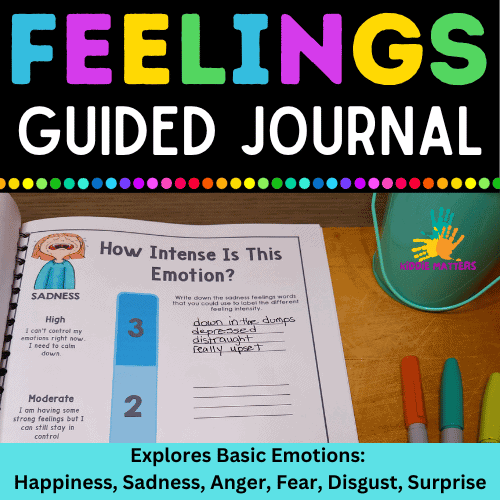The Best De-escalation Plan for Defiant and Disrespectful Students
Some days I feel like a failure when it comes to helping kids manage their behaviors. I find myself questioning every interaction, every intervention, wondering if I could have done more, said more, listened better.
Despite my best efforts, I still feel inadequate and like I’m falling short in the one role I’m meant to excel in. I want my students to grow up to be resilient, empathetic, and successful people.
I have this mental image of them as adults– calm, caring, and respectful. But then I think about some of the kids I serve.
The students who lash out in anger and become disrespectful. My runners who elope to challenge authority and avoid doing class work. Then there are my loners who feel isolated and lonely and cope by withdrawing and skipping class.
The pressure to find a solution and ‘fix’ things is overwhelming.
Bonus: As a bonus for joining my weekly newsletter, get this free cheat sheet of the 7 Step De-escalation Plan that will help you manage students’ disrespectful and disruptive behaviors.
But Here’s The Thing…
It’s not always clear how to help kids overcome the behavior challenges they’re facing now, so that they can grow into the successful adults they have the potential to become.
We’re lucky if we can get kids to stop using their devices in class, let alone help them grow into responsible adults who think before they act, have empathy for others, and regulate their emotions in healthy ways.
And yet, if you want kids to succeed and to promote a positive and respectful school environment, it’s crucial that you find effective ways to help them manage their problem behaviors. This prompted me to learn as much as I could about behavior management and here’s what I found.
Not A Storm You Want To Get Stuck In
When you find yourself caught in a situation where your student is engaging in defiant behaviors, it can feel like you’re navigating through the rough waters of an emotional storm with no guidance or support.
You want to steer things back to calm waters, but one wrong move and you’re swept away into unpredictable directions, uncertain of where you’ll end up.
But your student feels caught in an emotional storm too. The more their needs for attention, validation, and connection go unmet, the more the storm picks up and intensifies.
Your student lashes out, desperate to be seen and heard. Anything to get their needs met. And you call them out and reprimand them for their behaviors.
And why wouldn’t you? The student is disrupting the classroom and disrespecting you in front of other students. You can’t just ignore them. It’s your responsibility to maintain a calm and safe learning environment.
But here’s what you don’t see.
Your student is trapped in the eye of an emotional storm too, drowning in feelings like frustration, anxiety, and loneliness. Stress hormones have hijacked their nervous system, making it hard to calm down. They’re in a state of fight or flight and will either lash out (fight) or withdraw (flight).
During the “fight or flight” response, our prefrontal cortex, the part of our brain that helps us think logically and make decisions, doesn’t work as well. Instead, other parts of our brain, like the amygdala and the hypothalamus, take over to help us react quickly. This means that when kids are really stressed, they might act more on instinct and less on careful thinking.
What Disrespectful Students Need From You
They need you to help them drop anchor.
They need you to validate their feelings and understand what they’re going through, even if you don’t condone their behaviors.
They need your help to weather the storm and calm their nervous system, so that they can release the pressure building inside and flush out the stress hormones keeping them stuck in fight-or-flight mode. Until those hormones are out of their system, it’s like their body is on lockdown, unable to move forward.
Because here’s the uncomfortable truth about when your students are defiant. You probably feel helpless and ill-equipped to calm the situation down–but your student likely feels that way too.
And in these moments, what your students need from you is empathy, empathy, and more empathy.
Related: Quick Fix to Help Kids Calm Their Nervous System
But You’re Only Human
When your student is being defiant, your stress response system is likely activated too! You feel anxious, frustrated, and even resentful if this is a student who chronically disrupts the learning environment.
You know you need to stay calm, but your emotions are overwhelming and cloud your ability to think clearly. When this happens, it’s difficult to take the necessary steps to de-escalate the situation.
Sometimes when I’m swimming in stress hormones, it’s almost impossible to get out of my feelings and into problem solving mode. What I’ve found useful is to have a plan of what strategies to use to navigate these situations.
I also find it helpful to practice these strategies in calm situations. That way when you have to recall your plan under stressful conditions, it’s automatic. You’ve practiced the strategies and built the muscle memory of how to use them.
Free Cheat Sheet: 7 Step De-escalation Plan

How to Deal With Disrespectful Students
Below are 7 de-escalation strategies you can use to help kids regulate their emotions when they’re upset. I’ve made a handout of the 7 steps that you can download to help you remember the steps to take to calm a challenging situation down.
The next time you have a student being defiant and you feel ineffective because you’re unsure how to respond, try implementing the 7 Step De-escalation Plan.
But First,This Is A Must
Helping disrespectful students calm down when they’re being defiant is extremely important. But you can reduce the instances of students being disruptive and disrespectful by taking proactive measures to create a supportive and safe learning environment.
When students feel safe and supported, they are more likely to engage positively in learning activities and interact constructively with their peers and teachers.
By implementing proactive measures, you create a culture of respect, responsibility, and mutual support within the school community. Some effective proactive behavior management strategies include:
- Establish Clear Expectations: Be clear about rules, expectations, and consequences. Even though some kids will test the limits no matter what, it’s important that they have a clear understanding of the rules and consequences for not meeting expectations. Clear rules and expectations allow you to be consistent in how you respond to disruptive students. Some kids may need reminders to help them remember the rules and could benefit from having them posted or frequently reviewed.
- Create Structured Routines: Having a routine gives children structure and predictability. When students know what’s coming and have a regular schedule to follow, it makes them feel safe and stable. A set routine can also reduce feelings of anxiety and uncertainty. These are often underlying factors contributing to disruptive behaviors.
- Create a Calm Learning Environment: When the classroom atmosphere is peaceful and welcoming, students feel more relaxed and are better able to focus on learning. A calm environment can be achieved through various strategies, such as maintaining a tidy and organized space, using soft lighting and soothing colors, playing calming music, and incorporating mindfulness or relaxation exercises into the daily routine.
- Establish a Culturally Competent Learning Environment: Culturally competent classrooms create an environment where students feel valued, understood, and safe, which can help prevent behavior problems related to cultural misunderstandings or biases. One way to establish a culturally competent classroom is by incorporating diverse perspectives and experiences into the curriculum. This can include using materials and resources that reflect the diversity of the student body, discussing cultural traditions and practices, and celebrating cultural heritage months or events.
- Teach Social-Emotional Skills: Teaching kids social-emotional skills can help them learn how to regulate their emotions, communicate effectively, and develop healthy relationships. Social emotional skills such as emotional awareness and perspective-taking empowers children with tools to handle their emotions better, resolve conflicts peacefully, and make responsible decisions. This ultimately leads to improved behavior and overall well-being. The Guided Feelings Journal is a great way to help kids learn emotional awareness skills to help manage strong emotions and calm their nervous system.
- Praise Positive Behaviors: When kids are rude and disrespectful it can be difficult to build a positive relationship with them. According to psychologist Carolyn Webster-Stratton, founder of The Incredible Years Series for Parents, Children, and Teachers, children who are oppositional develop poor relationships with teachers due to their aggressive and disruptive behaviors. Webster-Stratton (1993) found that because of their negative behaviors, oppositional students received less encouragement and support from their teachers.
Although it’s important to address bad behavior, it’s equally as important (or even more so) to recognize and praise students when they show positive behaviors. When students only get attention for acting out, they learn that if they want attention, all they have to do is misbehave. They’re happy with whatever kind of attention they get, positive or negative. Additionally, praising positive behaviors reinforces the behaviors you want to see and encourages students to behave that way more often. - Positive Calls Home: Parents of students who act out in school typically get lots of phone calls home. However, when parents are only contacted when their child misbehaves, it can be demoralizing and strain the relationship between parents and educators. Some parents might start to think that their child is being singled out. Making positive calls home demonstrates to families that you value and appreciate their children. It also encourages students to continue engaging in the desired behaviors.

Best Strategies To Handle Disrespectful Students
- Stay Calm: Maintaining your composure during challenging situations helps to diffuse tension and promote a sense of safety and control. For instance, if a student becomes disruptive in class, take a moment to collect your thoughts, speak in a calm tone, and use non-confrontational body language. This approach can help prevent the situation from escalating further and create a more conducive environment for problem-solving. Also, by modeling calmness and self-regulation, you demonstrate effective conflict resolution skills and encourage students to manage their emotions constructively.
- Assess Safety: Ensure the physical and emotional safety of the student and others in the learning environment. If there are immediate safety concerns, address them promptly. For example, if a student starts throwing objects, intervene immediately. This might involve calmly guiding the student to a designated safe area in the classroom away from potential hazards, such as windows or sharp objects, while calmly speaking to them to help de-escalate the situation.
Similarly, emotional safety is crucial. If a student is displaying signs of distress or anxiety, such as withdrawing from peers or becoming visibly upset, create a supportive environment where they feel comfortable expressing their feelings. This might involve providing a quiet space for the student to calm down or offering reassurance and empathy to help them feel understood and supported. - Engage In Active Listening: When you actively listen to kids and teens, you show them empathy, understanding, and a genuine interest in what’s going on with them. This can help defuse tension and promote a sense of validation and respect. Active listening involves giving the student your full attention, maintaining eye contact, and using verbal and nonverbal cues to show that you are engaged and receptive to what they’re saying. Additionally, paraphrasing and summarizing children’s statements can help clarify their thoughts and feelings, providing you with a deeper understanding of the student.
- Validate Student: Approach the student calmly and respectfully, using a gentle tone of voice and non-threatening body language. Acknowledge their feelings and validate their experiences to show that you understand where they’re coming from. This can help defuse tension and open the lines of communication. It can also help to normalize children’s emotions to reduce feelings of shame or embarrassment. Below are some examples of validating statements:
“I can see that you’re frustrated right now. It’s okay to feel that way. I want you to know that I’m here to support you.”
“I understand that you’re feeling frustrated. The situation would frustrate me too. I want to support you. How can I help?”
“It’s okay to feel angry. I think if the same thing happened to someone else, they’d feel angry too.”
“Your feelings are valid and it’s OK to feel how you feel.” - Provide Choices: Offering students choices empowers them to regain a sense of control and ownership over their actions. For instance, you might ask the student if they would like to take a break to collect their thoughts, discuss their concerns privately, or participate in a calming activity like deep breathing or drawing. This approach not only encourages self-regulation. but also fosters a collaborative relationship where the student feels respected and supported in finding constructive solutions to their challenges.
- Offer Resources: After the situation de-escalates, provide information about supportive resources or coping strategies that the student can use to manage their emotions outside of the current situation. This could include introducing grounding techniques to help kids anchor themselves in the present moment so they can regain a sense of calm and control. Deep breathing exercises, for example, encourage students to focus on their breath, which slows down their heart rate and calms their nervous system. This free Calm Down Toolbox provides science-based strategies to help kids regulate their emotions and manage their behaviors in healthy ways.
- Follow-Up and Check-In: Follow up with the student to ensure they’re feeling okay and offer additional support if needed. Check in periodically to monitor their well-being and provide ongoing assistance.
Get Your Free Cheat Sheet!
When you’re in the middle of a negative interaction with a student, it can be hard for your brain to process the rational steps to de-escalate the situation. Use this cheat sheet to help you in those tough moments. It also helps to review this cheat sheet regularly!
- Get the free cheat sheet. You’ll get the printable, plus join my weekly newsletter! Just click here to get it and subscribe.
- Print. Any paper will do the trick, but card stock would be ideal.
- Put your cheat sheet somewhere handy like on your desk, on your office wall, or in your top desk drawer.
Before you go, get my FREE Calm Down Toolbox: DBT Tools To Help KIds Self-Regulate
Your Turn
What are some of your go to strategies for managing disrespectful and disruptive behaviors from kids and teens? Share in a comment below!






I love this! I am an elementary art teacher near Boston MA. in my 29th year and found this to be right on the money.. Thank you for your article.
Rhis is helpful
I have seven high school junior boys in one class of 20, who do not care about anything to fo with learning. They are very smug and feed off of each other. I have used, and still use, many of these suggestions, but nonthing seems to matter to them. They have an audience, so they keep going.
I am right there with you.
My class is the last block of the day, study hall.
No grades I can give and the only form of discipline a teacher can give is detention. That doesn’t phase them.
Calling home is no help. It seems to always be the teachers fault or wrong number.
I am sure their home life is difficult but so are the other 20 kids in the room. It is impossible to maintain any level of respect.
I believe ODD is just a cop-out for parents who didn’t discipline their children consistently and firmly enough in their early years.
We’ve created a disrespectful, entitled and self obsessed generation.
Sure there’s the odd child exempt of this but 9/10 of these ‘ODD’ kids are a product of their parents lack of discipline.